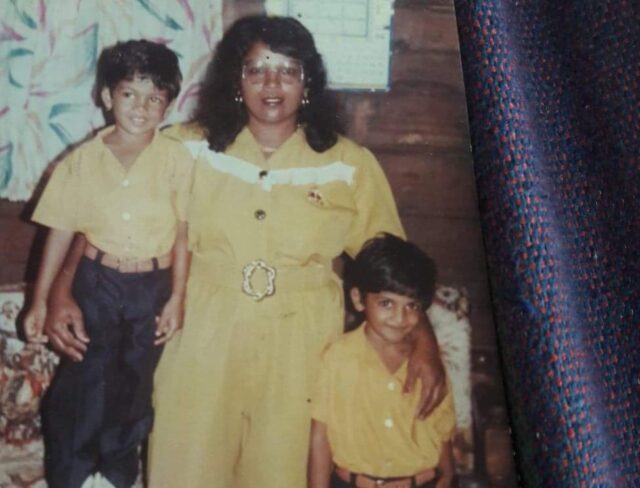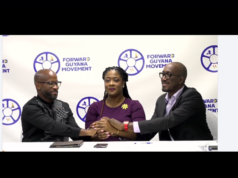By: Suraj Narine
For my children: Marianna & Kaiden
As the rooster emits what could possibly be his last crow before he is introduced to fresh coconut milk and Indi Special Madras Curry Powder, my father, knife in hand, paces in the fowl pen. A decision must be made. It is Christmas morning, and the clock has just struck 7. My mother, pot spoon in hand, leans up against the hammock, her feet swollen from standing all night cleaning, “putting to right” and baking.
My mother has always been a stickler for finishing holiday cooking early in the event there are unexpected visitors. Her motto is “Don cook early and cook extra because yuh nevah know who can baap in.” This remains her mantra decades later.
“Whole morning you ah pompazette out deh. Watch wha time now and nuttin nah don yet!” She shouted at my father, pointing at the imaginary watch on her hand.
But before she could colourfully regale the old man of her timeless maxim, a verdict has been reached. The unlucky avian victim is the very noisy rooster whom I’d come to love and secretly dubbed “Perry”. He was a huge cross-eyed Dominque, with a massive rose-like comb that hung over the side of his face. I knew him since he was a chick. Perry possessed this uncanny ability to wake me up at precisely 7 in the morning to begin my chores before school. He’d follow me everywhere. Even though he would ruin the bottom house after we paved it with a rich mixture of fresh cow’s dung and mud from the nearby trench, I found his antics endearing. But alas, Perry’s fate has been sealed – he is destined to be paired with puri. That was the Christmas of 2001.
I was a primary school child, just recently exposed to the pastoral life – a stark contrast to the sheltered existence in a Plantain Walk tenement yard east of our new home. Here, in Coghlan Dam, my brother and I would become exposed to agriculture, village politics and the reading of ruminant behavioural patterns. The elders would decipher signs of impending rain, risking entire patches of callaloo based on a cow’s behavior or leaving drums open to catch rainwater after a stampede. Even the irritating cackling of our cherished parrots, Polly and Robert, was a harbinger of rain.
While Perry’s demise was unfortunate, time has dulled my views on the matter. The year 2001 held many significant developments at home and abroad. It was the year that the Twin Towers fell, leaving the World in shock and grief. Even my father, who operated a tiny Guyanese Creole eatery near the Stabroek Market’s “Fishpond”, felt the enormity of this tragedy. Many of his elderly customers, who were more appreciative of traditional delicacies like kalongi, dhalpitti and dhoolpitti, relied heavily on remittances from loved ones abroad, particularly the U.S. Though financial challenges loomed over my family, my brother and I were too young to grasp such complexities. We expected the same from our parents that Christmas.
I do remember them meeting in the kitchen on the night before Christmas Eve to plan how they would spend my father’s December earnings.
“Can’t buy decorations and pot empty,” I heard the old man cautioning my mother.
“Yuh right,” she said, before adding, “Can’t buy rum and pot empty tuh”.
“Yuh right,” he replied.
“Wham to the toys for them boys?” She asked.
But all I heard were whispers too static to decipher.
Not long after, the budget was debated and passed.
That Christmas, my brother and I shared one toy. It was a replica of a bulldozer. We would take turns being “driver” and “police officer”. This was our father’s method of helping us navigate the challenges of having only one plaything. The “police officer” would skillfully direct traffic made up of clothes pins, mommy’s rice container and a few slippers, while the “driver” diligently pushed small heaps of sand near the front door. The arrangement spared my brother and me from any conflicts or fights.
My father, cognisant of my feelings for our poultry, sought to have me removed from the area where the chickens are slaughtered. My brother, who was older than me, was summoned to assist with the plucking of Perry, while I was sent to daub the fireside and chop wood.
Daubing the fireside was nasty work and I detested it. The process involves combining water with mud in a saucepan or bucket until the dirt reaches the desired consistency. This serves a dual purpose—preventing the fireside from cracking and fortifying its overall structure by thickening the walls of the fireside. Additionally, the same slurry is used to coat the undersides of pots and karahis to avoid the build-up of “blackpat” (soot). This not only protects the exterior of the cookware from excess heat, but also ensures a shiny appearance after washing.
Chopping wood was not something I enjoyed, but I welcomed it that Christmas morning because I needed something to work off my frustration. A wallaba post fell victim to my axe and machete. After that, I excused myself from the home so I could grieve on my lonesome in the backyard. There, I met my mother picking herbs from the kitchen garden.
I ignored her at first, thinking how she could allow herself to be part of this cruelty. My mother took one look at me and sang familiar tune, “Bing bing bing, bi-ding bi-ding bing bing bing!!” It was the song she’d sing to lull me when I was much smaller. It was her way of letting me know that everything was going to be okay.
“You mek daddy do that to Perry. Me na talk to you,” I said, sheepishly hiding my smile.
“You know wha pig bin ask he mumma?” She queried.
“No,” I replied.
“He bin ask she, ‘mumma how yo mouth so long?’, and mumma seh, ‘Ahh pickney, you a grow’,” she said.
The proverb held sentimental value for my Nani, my grandmother, capturing the innocence of children as they navigate life with curious questions. Some answers, it suggests, only reveal themselves with time and maturity. Perry’s unfortunate but necessary death echoed this theme. My mother then revealed that because of our family’s financial situation, she was forced to sacrifice her Christmas decorations, walnuts, ‘ice apple,’ and grapes, just to ensure that we had actual food on the table.
I joined her in the kitchen, where we started setting up the hand mill to grind split peas for the dhal puri. When lunchtime arrived, I declined to eat, but my mother was persistent, suggesting I have fried karaila (bitter gourd) with my puri instead. Repulsed by the idea, particularly on Christmas, I looked at the chicken curry in the basin on the table and I couldn’t hold back. I blurted out, “Give me the leg!”









